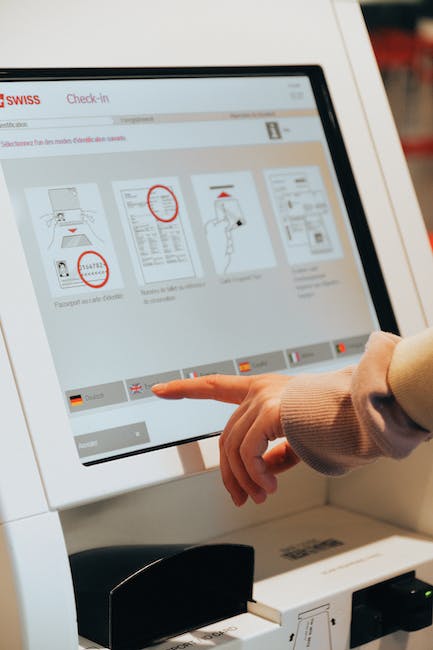Bespoke Kiosk Software
What is Kiosk software?
Kiosk software is a specialized type of software that is designed to run on self-service kiosks which are often found in public places such as airports, malls, and movie theaters. Kiosk software can perform a wide range of functions, including displaying information, processing transactions, and providing customer service.Contact us if you are wanting to have a bespoke Kiosk application developed?
One of the most common uses for kiosk software is in retail environments. Retailers can use kiosk software to enable customers to browse and purchase products, check prices and availability, and even customize or personalize their purchases. Kiosks can be especially useful for retailers who want to extend their sales capabilities beyond the physical store by enabling customers to make purchases anytime, anywhere.
Another popular use for kiosk software is in healthcare settings. Hospitals and clinics can use kiosks to assist patients with check-in and registration, provide wayfinding information and directions, and even allow patients to schedule appointments and pay bills. Kiosks can help streamline the patient experience, reduce wait times, and improve overall efficiency.
Kiosk software is also used in the hospitality industry, where it can be used to provide guests with information on hotel amenities and services, enable them to check in and out of their rooms, and even allow them to order room service or book activities and tours.
Overall, custom kiosk software can be an effective tool for businesses across a range of industries, enabling them to increase efficiency, reduce costs, and provide a better experience for their customers or clients.

What are the main functions of Kiosk software?
Kiosk software typically consists of several modules that work together to provide a seamless experience for users. These modules can vary depending on the specific needs of the project, but the following are some of the most common:1. User Interface: The user interface (UI) module is responsible for displaying the kiosk's design and graphics to the user. It includes visual elements such as buttons, text boxes, and images, and it is typically designed to be easy to navigate and use.
2. Content Management: The content management module stores and manages the information that is displayed on the kiosk. This can include product information, event schedules, or other types of content that is relevant to the user.
3. Payment Processing: Many kiosks are designed to accept payments, and the payment processing module handles this functionality. It securely processes credit card transactions and ensures that the user's payment information is kept safe.
4. Remote Management: The remote management module allows administrators to manage the kiosk from a centralized location. This can include updating content, monitoring usage statistics, and troubleshooting issues.
5. Security: Security is a critical component of any kiosk software. The security module includes features such as encryption, authentication, and access control to ensure that the kiosk and the user's information are kept safe.
Overall, kiosk software provides a range of functionality that is designed to provide a seamless and intuitive experience for users. By leveraging these modules, business owners can create custom kiosks that meet the unique needs of their customers and their business.
Data / systems integration
Kiosk software is often integrated with various systems, such as point-of-sale (POS) systems, customer relationship management (CRM) software, inventory management systems, and digital signage solutions. The integration is typically achieved through the use of APIs or other tools that provide the kiosk software with access to relevant data from these systems.When considering integration with other systems, there are several key considerations. First, it is important to ensure that the APIs or tools being used are reliable and secure, as any vulnerabilities could potentially compromise the entire system. Second, compatibility between systems is critical, as different systems may use different data formats or have varying requirements for data input and output. Finally, it is essential to consider the impact of system integrations on overall performance and efficiency, as poorly designed or implemented integrations can lead to slow response times, reduced functionality, and other issues.
Overall, integrating kiosk software with other systems can provide significant benefits for businesses, including improved data management, enhanced customer interactions, and streamlined operations. However, it is important to approach integration in a thoughtful and strategic manner, taking into account the unique needs and requirements of your business and your customers.
Who uses Kiosk software?
Kiosk software is used by a wide range of organizations including retail, healthcare, hospitality, transportation, government, and financial services. Within each of these verticals, kiosks can be found in organizations of all sizes, from small businesses to multinational corporations. For example, a small retail store may use a kiosk as a point-of-sale system, while a large airport may use kiosks for information and wayfinding. The flexibility and versatility of kiosk software allow it to serve a wide variety of organizational needs and serve customers in unique ways.
Benefits of Kiosk software
Organizations use kiosk software for a variety of reasons. One of the key benefits is that it can help to reduce staffing costs by providing self-service options to customers. Additionally, kiosks can help to improve customer satisfaction by enabling customers to quickly and easily access information or complete transactions at any time. Another advantage of kiosk software is that it can be customized to meet the specific needs of a particular business, providing a tailored solution that meets the unique requirements of each organization. Furthermore, kiosks can help to increase sales and revenue by enabling businesses to promote their products and services through interactive displays and promotions. Finally, kiosk software can help to improve efficiency and productivity within organizations by streamlining processes and providing employees with access to important information in a timely manner. Overall, kiosk software is a powerful tool that can help businesses to achieve their goals and succeed in today's fast-paced and competitive marketplace.Some of the players in the Kiosk software market
One of the main brands of kiosk software is KioWare. Its key benefits include easy integration, customization options, and remote management capabilities. However, some customers have reported limited support for newer hardware and occasional glitches.Another popular brand is SiteKiosk, which boasts features such as secure browsing, touchscreen compatibility, and multi-language support. Despite its benefits, some customers have expressed frustration with the software's user interface, as well as occasional crashes and freezes.
PROVISIO's SiteCaster is another option for custom kiosk software development. Key benefits include a drag-and-drop interface, efficient content management, and responsive design. However, customers have noted some difficulties with integrating third-party applications, as well as limited options for advanced customization.
Finally, the kiosk software from Livewire Digital offers benefits such as real-time data analytics, customizable branding, and robust security features. However, some customers have reported difficulties with the software's user interface and occasional issues with hardware compatibility.
Overall, it's important for business owners to carefully consider their specific needs and requirements when selecting a kiosk software solution, as each brand has its unique strengths and weaknesses.
Benefits of off-the-shelf Kiosk software
Off-the-shelf kiosk software can offer a number of benefits for businesses, including:1. Affordability: Off-the-shelf kiosk software tends to be more affordable than custom software development, making it an ideal choice for small to medium-sized businesses.
2. Ease of use: Due to the fact that off-the-shelf kiosk software is designed for a wider audience, it tends to be relatively easy to use and set up, without requiring extensive training or technical knowledge.
3. Time-saving: Rather than needing to spend time creating custom kiosk software from scratch, businesses can simply purchase an off-the-shelf solution and begin using it right away.
4. Flexibility: While off-the-shelf kiosk software may not be tailored specifically to your business needs, it often includes a range of customization options, allowing you to adapt it to your unique requirements.
5. Testing: Because off-the-shelf kiosk software is already widely used, it often undergoes extensive testing and bug fixing, resulting in a high-quality product that is less likely to have issues than custom software that has not yet been tested in the field.
Limitations of off-the-shelf Kiosk software
Off-the-shelf kiosk software can be a tempting option for business owners who want a quick and affordable solution. However, there are limitations to these pre-made software programs that can ultimately hinder the success of a business's self-service kiosks.One major limitation of off-the-shelf kiosk software is the lack of customization options. These programs often come with limited design options and pre-set functionality, meaning businesses are unable to create a unique user experience that aligns with their brand and specific needs.
Another limitation is the lack of security features. Many off-the-shelf kiosk software programs are not designed with security in mind, leaving businesses vulnerable to potential cyber threats and data breaches.
In addition, off-the-shelf kiosk software may not integrate seamlessly with a business's existing systems and technology. This can lead to issues with data synchronization and ultimately lead to a disjointed customer experience.
Finally, off-the-shelf kiosk software may not be able to handle complex workflows and processes. For example, a business may require a custom software solution that integrates with their internal inventory management system in order to accurately track product availability and prevent over-ordering.
Overall, while off-the-shelf kiosk software may seem like an affordable and convenient solution, the limitations can ultimately hinder a business's success. Custom kiosk software development provides businesses with the flexibility, security, and customized features necessary to create a successful and streamlined self-service experience.
Is bespoke Kiosk software a viable option?
Bespoke or partially bespoke kiosk software is an excellent option for businesses looking to improve their customer experience by providing highly customized and intuitive interfaces that meet specific requirements. Here are some benefits of bespoke kiosk software:1. Increased efficiency: Bespoke kiosk software can streamline the workflow for businesses by automating tasks that were traditionally handled by employees, such as taking orders or processing payments. This can free up staff to focus on other core tasks, thereby increasing productivity.
2. Tailored to fit specific business requirements: Companies can have custom-designed kiosk software that is tailored to their specific needs. This means they can have a kiosk that is designed for their unique use cases.
3. Improved user experience: Custom kiosk software can provide customers with an intuitive interface that is easy to use and understand, thereby improving their experience. This can lead to increased customer satisfaction, repeat business and positive word-of-mouth referrals.
4. Enhanced branding: If the kiosk is customer-facing, bespoke software can allow companies to brand their kiosk with their colors, logo, and other graphics. This can help to build brand awareness and brand loyalty.
Successful use cases of bespoke kiosk software include applications in retail, hospitality, and healthcare. For example, retailers can use custom kiosk software to create an interactive shopping experience for customers, allowing them to search for products, view product details, and make purchases. In the hospitality industry, kiosks can be used for self-service check-ins, ordering, and payment. In healthcare, custom kiosks can help to streamline patient check-ins and provide appointment scheduling, lab results, and other healthcare-related information.
In conclusion, bespoke kiosk software can deliver many benefits to businesses. When paired with the right hardware and backend systems, it can improve efficiency, enhance the user experience, and increase customer satisfaction.

Fun facts about Kiosk software
Kiosk software has become increasingly popular in recent years, with the market expected to reach $1.5 billion by 2024. This growth is due to the many benefits that kiosks provide to businesses, such as increased efficiency, reduced labor costs, and improved customer satisfaction.One interesting trend in the kiosk software market is the rise of self-service kiosks in the fast-food industry. Nearly 80% of quick-service restaurant chains are expected to adopt self-service kiosks by 2022, driven by demands for faster service and increased customization options.
Another trend is the integration of artificial intelligence and machine learning technology in kiosk software. This allows kiosks to provide more personalized experiences for customers, such as recommending products based on past purchases or providing tailored recommendations based on a customer's preferences.
Kiosk software is also becoming more prevalent in industries beyond retail and fast food, such as healthcare and transportation. In the healthcare industry, kiosks are being used for patient check-ins and appointment scheduling, while transportation kiosks provide travelers with information about routes, schedules, and fares.
Overall, custom kiosk software offers a wide range of benefits for businesses, from increased efficiency to improved customer satisfaction. As technology continues to evolve, we can expect to see even more exciting developments in the world of kiosk software.
Kiosk software FAQ
1. What are the benefits of having a custom kiosk software developed for my business?A custom kiosk software can offer a range of benefits for your business, including increasing customer satisfaction through personalized experiences, reducing wait times and improving efficiency, enhancing brand recognition and loyalty, and providing valuable data for business insights and analysis.
2. How long does it take to develop a custom kiosk software?
The timeline for developing a custom kiosk software can vary greatly depending on the complexity of the project, the specific needs of the business, and other factors. It's important to work closely with a software development company to define the scope of the project and establish a realistic timeline.
3. What are the typical features of a custom kiosk software?
The features of a custom kiosk software can vary greatly depending on the needs of the business. Some common features include self-service options, touch screen displays, payment processing, data collection and analysis, and integration with other systems such as inventory management or customer relationship management.
4. How will my custom kiosk software be maintained and updated?
It's important to establish a maintenance plan with the software development company to ensure that the kiosk software remains up to date and functioning properly. This may include regular software updates, hardware maintenance, and troubleshooting support.
5. Can I integrate my custom kiosk software with other systems or software?
Yes, a custom kiosk software can be designed to integrate with other systems or software that your business uses. This can provide a seamless experience for both customers and employees, and help to streamline business operations.
6. What are the development costs associated with a custom kiosk software?
The costs of developing a custom kiosk software can vary greatly depending on the specific needs of the business and the complexity of the project. It's important to work closely with a software development company to establish a budget and obtain a detailed cost estimate.
7. How can I ensure that my custom kiosk software is secure and protects customer data?
Security is a top priority when developing a custom kiosk software. It's important to work with a software development company that has experience in designing secure systems and uses best practices for data protection. This may include encryption, secure data storage, and regular security audits.
Next Steps?
If you are considering bespoke kiosk software or require systems integration or data migration services, we invite you to get in touch with our team of experts. With years of experience in the industry, we have the know-how and market knowledge to create innovative solutions tailored to your specific business needs. Our commitment to delivering high-quality software and exceptional customer service is unyielding. We employ a high degree of perplexity and burstiness in our approach to ensure that every project is unique, engaging, and ultimately, successful. So why wait? Contact us today and let us help take your business to the next level!Read more about the main software category Other Applications.
Other services in Other Applications category:
Want a quick quote for the development of custom Kiosk Application?
Contact us to discuss your questions about bespoke Kiosk Applications.
